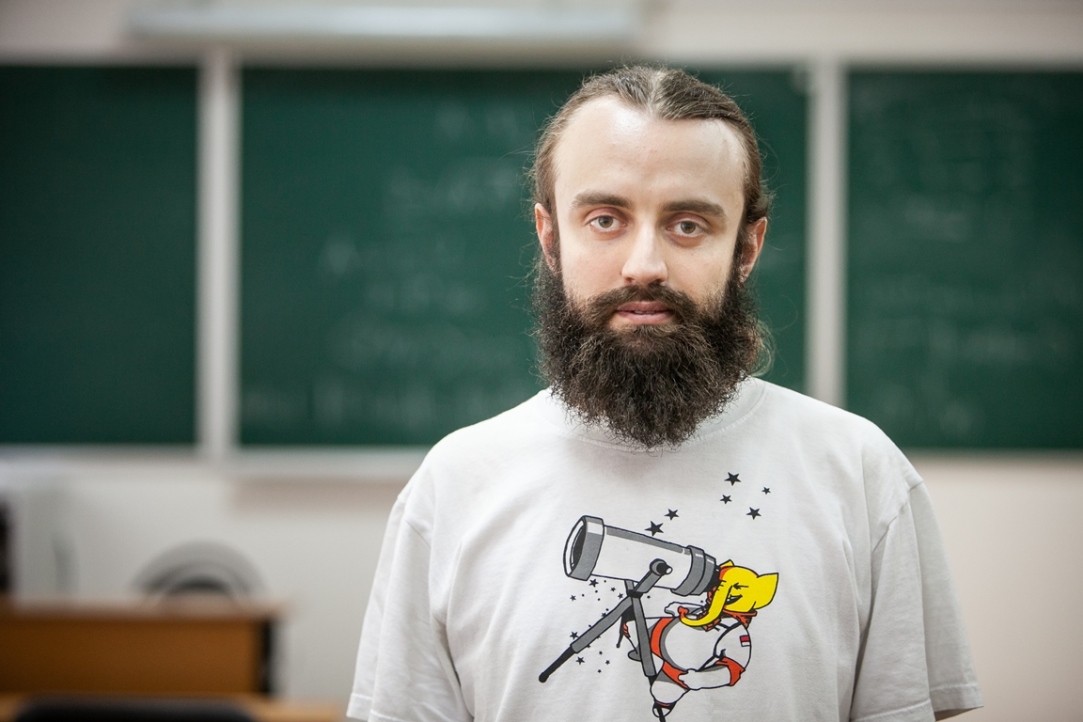First PhD at HSE Received under New Procedure

On May 22, the first thesis for an HSE PhD degree was defended. Following the new procedure, mathematician Pavlo Gavrylenko defended his thesis on isomonodromic deformations and quantum theory. This took place not before a big dissertation council, but a committee of experts in this particular field of mathematical physics.
After getting the right to award its own academic degrees in August 2017, HSE has reformed the dissertation councils and the defense procedure. Now, the defenses are carried out by special committees formed by dissertation councils for each specific paper. The new system is aimed at guaranteeing a high-quality assessment for theses, which is particularly important, since the university bases its reputation on the new candidates and doctors of sciences. (At the same time, HSE is staying within the state system of academic staff attestation, and the HSE degree will have the status of a state one).
‘Within one dissertation council, it’s impossible to attract a sufficient amount of experts in the field of each thesis defended’, explained Sergei Lando, head of the HSE dissertation council in mathematics, ‘For example, Pavlo Gavrylenko’s field is not far from my research interests, but I can’t say I know it in detail. This is why we need the experience and professionalism of the committee, which is formed for each specific thesis’.
The dissertation council chooses the committee members not only from HSE, but from other institutions, and this is an obligatory condition. ‘The range of scholars we choose from is very wide. It includes almost the whole global mathematical community’, Sergei Lando said.
‘This paper excited me’, Semyon Shlosman admitted, ‘It’s always very satisfying when there is a new link between areas of mathematics that have existed apart from each other for a long time’
For example, the committee for Pavlo Gavrylenko’s paper included HSE professors Evgeny Feigin and Igor Krichever, as well as Prof. Anton Zabrodin (HSE, Skoltech, RAS Institute of Biochemical Physics), Sergey Shadrin, Professor at the University of Amsterdam, and Prof. Semyon Shlosman (French National Centre for Scientific Research, Skoltech).
Pavlo Gavrilenko got his bachelor’s degree from Kyiv National University, his master’s degree from HSE, then completed the HSE Faculty of Mathematics doctoral programme supervised by Prof. Andrey Marshakov, and now carries out research at the HSE International Laboratory of Representation Theory and Mathematical Physics. His thesis was dedicated to the correlation between isomonodromic deformations and conformal field theories with W-symmetry.
‘Solving mathematical problems with physical approaches isn’t new; this has successfully been done for decades’, said Pavlo, ‘But the field where I work started developing just recently, and I “fell for it” from its beginning. Nikolai Iorgov, one of the authors of the hypothesis that described such a correlation was my academic supervisor in Kyiv. I talked to him and his co-authors, Alexander Gamayun and Oleg Lisov, learned that there is such a field, it seemed exciting, and I started doing research in it’.
Each of the committee members who spoke at the defense process (their reviews are available on the HSE website) emphasized the relevance and uniqueness of the HSE doctoral student’s research. According to Anton Zabrodin, ‘judging by the volume and relevance of its research results, the thesis could be a doctoral one’. And Evgeny Feigin, among other things, said that the dissertation ‘contains a lot of beautiful maths’.
All of the participants agreed that this first experience of thesis defense by the new procedure was successful
‘This paper excited me’, Semyon Shlosman admitted, ‘It’s always very satisfying when there is a new link between areas of mathematics that have existed apart from each other for a long time. This happens in mathematical physics as well. For example, one of Pavlo’s topics – Painlevé equations – used to exist as an independent mathematical object. And later, the same equations started appearing in other fields, including conformal field theory’.
Pavlo Gavrylenko will be the first student to get an HSE PhD degree. And all of the participants agreed that this first experience of thesis defense by the new procedure was successful. ‘If the next steps are as successful, the theses in mathematics defended at HSE will be recognized at the highest global level. Pavlo’s paper, undoubtedly, conforms to this level, so we’re off to a good start, Prof. Shlosman believes.
See also:
First PhD Thesis Presented as Articles on the Topic Defended at HSE
On September 11, Ivan Smirnov, graduate of the HSE Institute of Education doctoral programme, defended his Candidate of Sciences (Education) on ‘Differentiation of students by academic performance in a social network’. His thesis consists of four articles which had been published in academic journals, as well as a description of the study methods, design and main outcomes.
Leading Universities and the Right to Award Academic Degrees
Last year, the Russian Federation gave leading universities the right to award their own academic degrees on a trial basis, and this prompted universities to create models for future implementation. What the new system will bring and what needs to be done in order to render it fully operational was the focus of the board meeting of the Association of Global Universities, held on February 12 at HSE.
New Dissertation Councils Introduced at HSE
From February 1, 2018, new rules will apply to dissertation defense for Candidate of Sciences (PhD) and Doctor of Sciences (DS) degrees. Vadim Radaev, First Vice Rector at HSE, helped us understand what has changed, as well as how it is necessary to prepare for the defense process.


